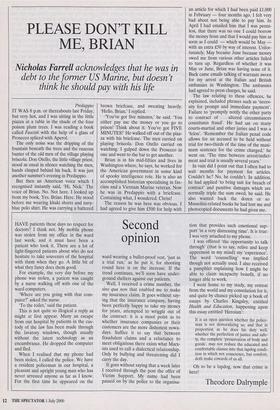Second opinion
HAVE patients these days no respect for doctors? I think not. My mobile phone was stolen from my office in the ward last week, and it must have been a patient who took it. There are a lot of light-fingered patients about who do not hesitate to take souvenirs of the hospital with them when they go. A little bit of what they fancy does them good.
For example, the very day before my phone was stolen, a patient was caught by a nurse walking off with one of the ward computers.
`Where are you going with that com- puter?' asked the nurse.
`To the toilet,' said the patient.
This is not quite so illogical a reply as might at first appear. Many an escape from our hospital by patients in the cus- tody of the law has been made through the lavatory windows, though usually without the latest technology as an encumbrance. He dropped the computer and fled.
When I realised that my phone had been stolen, I called the police. We have a resident policeman in our hospital, a pleasant and upright young man who has never arrested anyone as far as I know. For the first time he appeared on the ward wearing a bullet-proof vest, 'just as a trial run,' as he put it, for shooting round here is on the increase. If the trend continues, we'll soon have under- ground shelters against our patients.
Well, I received a crime number, the sine qua non that enabled me to make my insurance claim. It goes without say- ing that the insurance company, having been perfectly happy to take my money for years, attempted to wriggle out of the contract: it is a moot point as to whether insurance companies or their customers are the more dishonest nowa- days. Suffice it to say that between fraudulent claims and a reluctance to meet obligations there exists what Marx- ists used to call a dialectical relationship. Only by bullying and threatening did I carry the day.
It goes without saying that a week later I received through the post the offer of Victim Support. My name had been passed on by the police to the organisa- tion that provides such emotional sup- port 'in a very distressing time'. It is true: I was very attached to my phone.
I was offered 'the opportunity to talk through' (that is to say, relive and keep uppermost in my mind) my 'experience'. The word 'counselling' was implied though not actually used. I also received a pamphlet explaining how I might be able to claim incapacity benefit, if no longer able to work.
I went home to my study, my retreat from the world and my consolation for it, and quite by chance picked up a book of essays by Charles Kingsley, entitled Health and Education, happening upon this essay entitled 'Heroism':
It is an open question whether the police- man is not demoralizing us; and that in proportion as he does his duty well; whether the perfection of justice and safe- ty, the complete 'preservation of body and goods', may not reduce the educated and comfortable classes into that lapdog condi- tion in which not conscience, but comfort, doth make cowards of us all.
Oh to be a lapdog, now that crime is here!
Theodore Dalrymple


























































 Previous page
Previous page